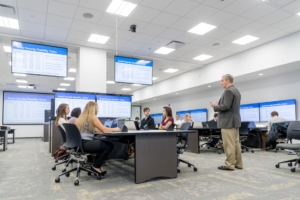
Inside a new analytics classroom recently opened at Notre Dame’s Mendoza College of Business. Photo by Matt Cashore/University of Notre Dame)
What trends are you seeing among B-school applicants?
I think there is this perception of business school applicants that finance is the only way to go to Wall Street. We’re seeing at least half of incoming students thinking finance is the right major, but Wall Street is hiring a lot of math and engineering majors. I’m a little concerned that students seem over-focused on finance without looking at business analytics or accounting.
While we’re happy with our success as a top business school and the financial success for students on Wall Street, the number of students going into accounting is disproportionate and finance is much longer. Finance is over portrayed as adventurous and where you get all the money, but you have to understand how money is made. Too many students have this glamorous view, but they get into the real world and understand it’s more about the quantitative side.
Also, because of artificial intelligence, a significant number of jobs will go away in 10 years because computers can do quantitative analysis. Students 10, 20, and 30 years from now will have to be creators of wealth not just managers of wealth. Students who like to think creatively and fix things they feel aren’t working will be in demand rather than students who say, ‘I went to the top schools and had the top scores.’ They just sort of float on their credentials, but never do anything dynamic. Those days are going to wane.
How popular is Mendoza compared to other colleges at Notre Dame?
It’s probably overly popular because of the rankings. I’m not anti-business, but the corporations hiring Notre Dame on a regular basis are very aggressively looking at liberal arts majors. Companies do not view things as the only major to hire from is business. At Goldman Sachs, recently their top hire from us was an anthropology major who convinced them during her sophomore or junior year to look at anthropology and how people interact with each other. It’s about different ways of thinking about problems and solving them. These companies like creative, problem-solving people and that’s not just limited to business.
Other than the business school, there is no other gatekeeper process for the other colleges at Notre Dame. We are one of the last schools to create a gate at the undergraduate level for it. There’s this over exuberance for business because of rankings and the economy and we needed to protect the size. There’s a certain quality that happens with class size and we need to ensure we’re delivering a quality product.
How large is your admissions staff?
In the Office of Undergraduate Admissions that I oversee, we have an admissions staff of about 45. 25 are in financial aid, then the rest are in other parts of the area that report into me and deal with reviewing applications and making admissions decisions.
Is there a team solely dedicated to business school students? How does the office operate?
We’re structured where everybody is assigned a geographic region, but have oversight over all applicants which would include the business school applicants. The former head of MBA admissions is our Director of Admissions so he has a lot of direct oversight as well. There are probably two staff members that become more expert on each college so two people do have some assignment to be aware of what changes are being made at the business school and putting it out in our admissions materials. We have a whole team of people that interact with all the colleges so we’re not segmented like some schools might be. I keep a hands-on touch as well since I’ve worked at a business school before.
What do you enjoy most about this job?
Even though I’ve been doing this 41 years, I still enjoy reading the application and hearing about a student’s life, what they think about the life they’ve lived so far, and what they want to establish by coming to my college. I love reading about their hopes and dreams. It’s fun and it’s interesting. Also, being in the position to confer on students the opportunity to come to Notre Dame. It’s a unique experience here. I’ve worked at the Ivy League, but Notre Dame is different and — in my mind — better for a lot of kids.
I also love to see which students will be most responsive to the unique opportunities and environment at Notre Dame. A lot of people want to come here because it’s first at things, but we have to be careful and protect Notre Dame. Out of the 20,000 applicants we get, over 8,000 are top 1% in the nation or top of their class in performance, yet only one out of three of them are admitted. We get to pick. About a third of the students we admit are not in the range of our average test scores or class performance, but we thought they were better because we looked at their motivations and consideration for others. That’s the Notre Dame view of things. Success, in the end, is courtesy and caring about others. We’re looking for kids that have that instinct.
DON’T MISS: CHRIS STEVENS: NOT YOUR AVERAGE B-SCHOOL PROF or MENDOZA STUDENTS CROWDFUND FOR FLORIDA SHOOTING VICTIM











Questions about this article? Email us or leave a comment below.